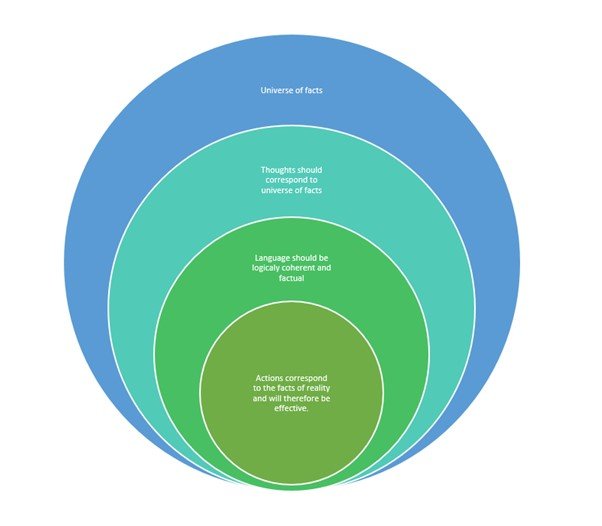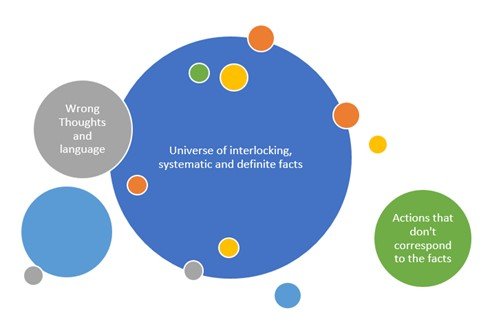How to Tell Whether an Idea is True
How to Tell Whether an Idea is True
We all operate according to the ideas that we believe to be true. But not all ideas are true.
Whenever people act according to a set of wrong ideas, then their chances of success are diminished.
It is important to have a method for distinguishing between those ideas that are likely to be true, and those that are not. How would we do that?
Let us start with a definition of what we mean by a "true statement". A true statement is one that "corresponds to reality".

The universe is a complete system of interlocking, coherent facts.
Human thought is the mental act of identifying, classifying, naming and logically evaluating this universe of "interlocking, coherent facts". For human thought to be correct, it must reflect the same nature as the universe it is trying to describe. Therefore, human thought should be a, "complete system of interlocking, coherent and factual ideas".
Human language is the verbal and written expression of our ideas about the universe. For human language to be logically correct, it too must share the same nature as the universe it is trying to describe. Therefore, language should be a coherent system of accurate identifications, unequivocal definitions, objective classifications and rational evaluations that exactly correspond to the universe it is trying to describe.
Human action is the physical expression of our ideas, thoughts and language. If we have been logically correct in our thinking and language, when we put them into practice, then our actions will be coherent with the facts. Consequently, they will work-out well in practice.
Incorrect human action. If we have been wrong, sloppy, lazy, or illogical in our thinking or language, then our subsequent actions will NOT be coherent with the facts. Consequently, they will NOT work out well in practice.
The above statements hold the clues to help us formulate the following set of test questions, that we use to determine whether an expert is promoting a true idea or not. (True meaning statements that correspond to the logical, systematic, coherent set of facts that make up the universe in which we live).
The test questions that we should apply to any speaker claiming to be an expert, are these:
- Are the theories an expression of a coherent, interlocking system of ideas, or are they an assemblage of spare parts, thrown together in the moment in response to the latest crisis?
- Is the theory based upon a set of clear and distinct definitions, or are there too many vague, fuzzy, dubious or ill-defined terms?
- Are they making too many unstated assumptions, which they never review and will not allow to be checked, or challenged?
- When put into practice, do their policies create obvious and glaring contradictions?
- When put into practice, do their policies create more problems than they solve?
- Do the experts apply their policies to themselves and their families, or do they make themselves exempt from the effects of their own policies?
- To motivate people, do the experts use threats, fear, or the "duty ethic", rather than reasoning and logic?
- Are the expert's arguments dependent on dubious statistics?
- Are their policies wreaking havoc amongst the most and the many?
If the answers to any these questions is yes, then we may not be listening to the best ideas.

Definition: true statement
Within business problem solving, a true statement is an assertion that aligns with the facts we can observe, expresses them in clear, exact words, shows no internal clash of logic, and stays correct when acted upon in practice. Remove any one of these traits and we can no longer call the statement true.
Show CG4D Definition
- matches observable facts
- uses clear and distinct terms
- contains no logical contradictions
- proves reliable when tested in practice
Article Summary
To know if an idea is true, match it to reality: check that its parts fit, its words are clear, its guesses are few, and its results solve more problems than they cause. Use these nine critical thinking steps to test any expert claim before you stake your time, money or trust.
Frequently Asked Questions
Here are some questions that frequently get asked about this topic during our training sessions.
What does “corresponds to reality” mean when judging if an idea is true?
Why do clear definitions matter in critical thinking steps?
How do hidden assumptions weaken an expert’s theory?
What sign shows a policy creates more problems than it solves?
How does the nine-question logic checklist spot false ideas fast?
Why should experts follow their own advice?
How does fear-based motivation flag unsound thinking?
Thought of something that's not been answered?
Did You Know: Key Statistics
Ofcom’s 2024 Online Nation report shows 62% of UK adults see false or wrong news online at least once each week, up from 55% in 2022. LinkedIn Learning’s 2024 Workplace Learning Report says 87% of employers worldwide name critical thinking and problem solving as their top skill need for 2025.Blogs by Email
Do you want to receive an email whenever we post a new blog? The blogs contain article 5-10 minutes long - ideal for reading during your coffee break!
Further Reading in General Development
Looking for Personal Development Training?
If you're looking to develop your General Development Skills, you may find this Personal Development Training Course beneficial:
Open Training Course Pricing and Availability
Next Open Course Starts in 6 days, Manchester City, places available






